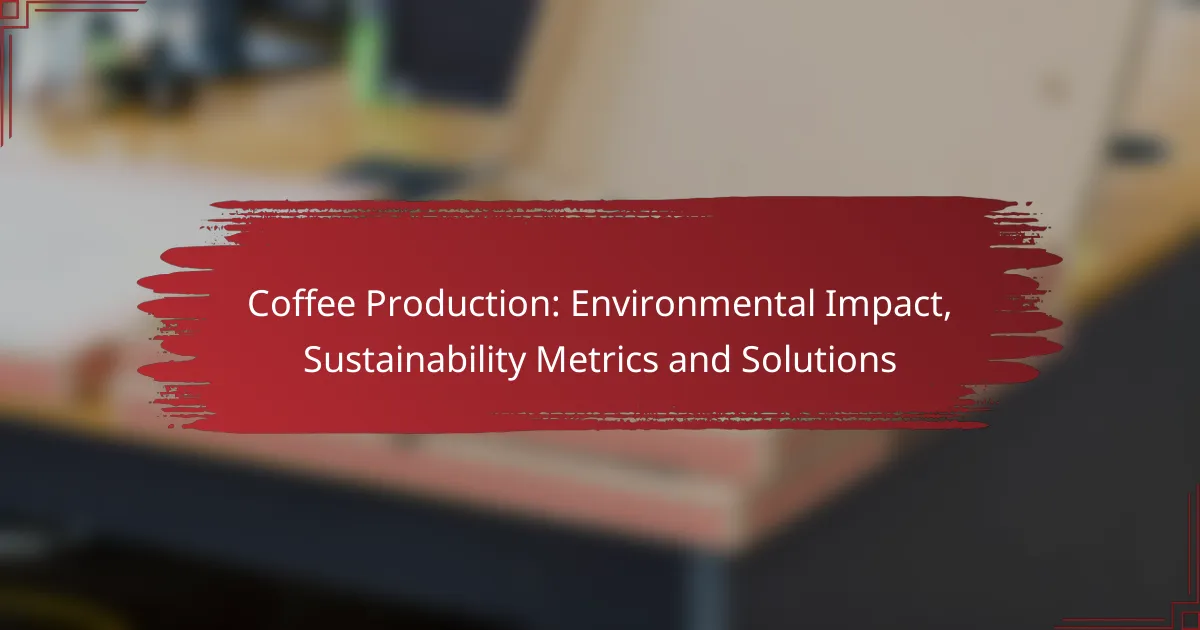Coffee production plays a crucial role in global agriculture, yet it poses significant environmental challenges, including deforestation and biodiversity loss. To address these issues, sustainable practices are being implemented to minimize ecological impact while ensuring economic viability for farmers. By focusing on metrics such as carbon footprint, water usage, and soil health, the coffee industry can work towards a more sustainable future.

What are the sustainable practices in coffee production?
Sustainable practices in coffee production focus on minimizing environmental impact while ensuring the economic viability of coffee farming. These practices aim to promote ecological balance, enhance biodiversity, and support fair labor conditions.
Shade-grown coffee
Shade-grown coffee is cultivated under a canopy of trees, which provides a natural habitat for various species and helps maintain soil health. This method reduces the need for chemical fertilizers and pesticides, promoting a more balanced ecosystem. It can also enhance the flavor profile of the coffee, as the slower maturation process allows for more complex flavors to develop.
Organic farming methods
Organic farming methods avoid synthetic fertilizers and pesticides, relying instead on natural alternatives to nourish the soil and control pests. This approach not only protects the environment but also results in healthier coffee beans. Farmers often use compost, cover crops, and crop rotation to maintain soil fertility and reduce erosion.
Water conservation techniques
Water conservation techniques in coffee production include practices such as drip irrigation and rainwater harvesting. These methods help reduce water usage and ensure that coffee plants receive adequate moisture without depleting local water sources. Implementing efficient irrigation systems can lead to significant water savings, especially in regions facing water scarcity.
Agroforestry systems
Agroforestry systems integrate coffee cultivation with other crops and trees, creating a diverse ecosystem that enhances biodiversity and soil health. This practice can improve resilience to climate change and pests while providing additional income sources for farmers. By planting native trees alongside coffee, farmers can also sequester carbon and improve overall farm sustainability.
Fair Trade certification
Fair Trade certification ensures that coffee farmers receive fair prices for their products, promoting social equity and sustainable development. This certification often includes environmental standards that encourage sustainable farming practices. By choosing Fair Trade coffee, consumers can support ethical practices that benefit both farmers and the environment.

How does coffee production impact the environment?
Coffee production significantly impacts the environment through deforestation, water usage, soil degradation, and biodiversity loss. These factors contribute to ecological imbalance and pose challenges for sustainable farming practices.
Deforestation effects
Coffee cultivation often leads to deforestation, particularly in tropical regions where forests are cleared to make way for coffee plantations. This loss of trees disrupts local ecosystems and contributes to climate change by increasing carbon emissions.
In some countries, such as Brazil and Colombia, large areas of rainforest have been converted into coffee farms, resulting in habitat destruction for numerous species. Sustainable coffee farming practices, like agroforestry, can help mitigate these effects by integrating coffee plants within forested areas.
Water usage and pollution
Coffee production requires substantial water resources, with estimates suggesting that it takes several thousand liters of water to produce just one kilogram of coffee. This high water demand can strain local water supplies, especially in regions facing drought.
Additionally, the use of fertilizers and pesticides in coffee farming can lead to water pollution. Runoff from these chemicals can contaminate nearby rivers and lakes, harming aquatic life and affecting local communities. Implementing organic farming practices can reduce chemical usage and promote cleaner water sources.
Soil degradation
Intensive coffee farming can lead to soil degradation, characterized by nutrient depletion and erosion. Continuous planting of coffee without proper soil management practices can strip the land of essential nutrients, reducing its long-term productivity.
To combat soil degradation, farmers can adopt techniques such as crop rotation, cover cropping, and organic amendments. These practices help maintain soil health and enhance its ability to support coffee plants sustainably.
Biodiversity loss
The expansion of coffee plantations often results in habitat loss for various plant and animal species, leading to a decline in biodiversity. Monoculture farming practices, where only coffee is grown, further exacerbate this issue by limiting the variety of organisms that can thrive in these environments.
Encouraging biodiversity through shade-grown coffee and intercropping can help restore habitats and support wildlife. Such practices not only benefit the environment but can also improve coffee quality and resilience against pests and diseases.

What are the metrics for measuring sustainability in coffee?
Metrics for measuring sustainability in coffee encompass various environmental and social factors that impact production. Key areas include carbon footprint analysis, water usage, soil health, and social impacts, each providing insights into the sustainability of coffee farming practices.
Carbon footprint analysis
Carbon footprint analysis quantifies the total greenhouse gas emissions associated with coffee production. This includes emissions from farming, processing, transportation, and packaging. Sustainable practices aim to reduce this footprint through methods like agroforestry, which can lower emissions by enhancing biodiversity.
Farmers can utilize tools like the Cool Farm Tool to estimate their carbon emissions and identify areas for improvement. Aiming for a reduction of 20-30% in carbon emissions over a few years can significantly enhance sustainability.
Water usage metrics
Water usage metrics assess the volume of water required for coffee cultivation and processing. Efficient water management is crucial, especially in regions prone to drought. Sustainable coffee farms often implement rainwater harvesting and drip irrigation to minimize water waste.
On average, producing one kilogram of coffee can require between 10,000 to 20,000 liters of water. Farmers should strive to reduce this figure by adopting water-efficient practices and technologies.
Soil health indicators
Soil health indicators evaluate the quality and fertility of the soil used for coffee cultivation. Healthy soil supports plant growth and reduces the need for chemical fertilizers. Key indicators include organic matter content, pH levels, and microbial activity.
Practices such as cover cropping and composting can enhance soil health. Farmers should aim for a minimum organic matter content of 3-5% to ensure optimal soil conditions for coffee plants.
Social impact assessments
Social impact assessments measure the effects of coffee production on local communities, including labor conditions, economic benefits, and social equity. Sustainable coffee practices prioritize fair wages and safe working conditions for laborers.
Engaging with local communities and adhering to certifications like Fair Trade can improve social outcomes. Regular assessments should be conducted to ensure that the benefits of coffee production are equitably distributed among all stakeholders involved.

What are the certifications for sustainable coffee?
Certifications for sustainable coffee help consumers identify products that adhere to environmental and social standards. These certifications ensure that coffee is produced in ways that protect ecosystems, support farmers, and promote fair trade practices.
Rainforest Alliance certification
The Rainforest Alliance certification focuses on sustainable farming practices that protect biodiversity and improve livelihoods. Coffee producers must adhere to strict environmental and social criteria, which include conserving natural resources and ensuring fair treatment of workers.
To achieve this certification, farms undergo regular audits to verify compliance with the standards. This certification is recognized globally and appeals to environmentally conscious consumers who prioritize sustainability in their purchasing decisions.
USDA Organic certification
The USDA Organic certification ensures that coffee is grown without synthetic fertilizers, pesticides, or genetically modified organisms. This certification promotes ecological balance and biodiversity, making it a popular choice among health-conscious consumers.
To be certified organic, coffee farms must follow specific practices for at least three years before their products can be labeled as organic. This includes maintaining soil health and using natural pest control methods, which can lead to higher production costs but often results in premium pricing for the final product.
Fair Trade certification
Fair Trade certification aims to provide fair wages and working conditions for coffee farmers, particularly in developing countries. This certification ensures that producers receive a minimum price for their coffee, which helps protect them from market fluctuations.
In addition to fair pricing, Fair Trade promotes community development and environmental sustainability. Farmers are encouraged to engage in sustainable practices, and consumers can support ethical sourcing by choosing Fair Trade certified coffee brands.

How can consumers support sustainable coffee production?
Consumers can support sustainable coffee production by making informed choices that prioritize environmentally friendly practices and ethical sourcing. By selecting certified brands, engaging with local cooperatives, and advocating for sustainable practices, individuals can contribute to a more sustainable coffee industry.
Choosing certified brands
Selecting certified coffee brands is a straightforward way to ensure that your purchase supports sustainable practices. Look for certifications such as Fair Trade, Rainforest Alliance, or USDA Organic, which indicate adherence to specific environmental and social standards. These certifications often guarantee better wages for farmers and environmentally friendly farming methods.
When shopping, consider the price range of certified coffees, which may be slightly higher than conventional options. This premium often reflects the true cost of sustainable farming and supports the livelihoods of coffee producers.
Participating in local coffee cooperatives
Joining local coffee cooperatives can enhance community engagement and support sustainable coffee production. These cooperatives often focus on organic farming practices and fair trade principles, ensuring that profits are distributed equitably among members. By purchasing coffee from these cooperatives, consumers can directly contribute to local economies and environmentally friendly practices.
Consider visiting local farmers’ markets or community-supported agriculture (CSA) programs to find cooperatives that sell directly to consumers. This not only supports sustainability but also fosters a connection between consumers and the source of their coffee.
Advocating for sustainable practices
Advocating for sustainable coffee practices involves raising awareness and influencing change within the coffee industry. Consumers can engage with brands on social media, participate in campaigns, or support legislation that promotes sustainable agriculture. By voicing their preferences for environmentally responsible products, consumers can drive demand for sustainable practices.
Additionally, sharing information about the benefits of sustainable coffee production can inspire others to make informed choices. Consider organizing or participating in community events focused on sustainability in coffee, which can amplify your impact and foster a collective effort towards change.



